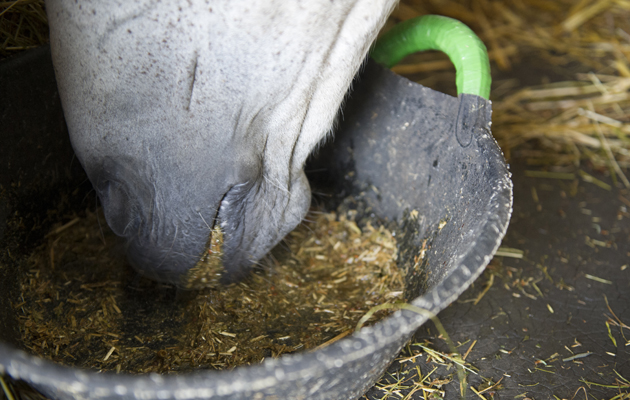Horse & Hound reports from the National Equine Forum, where topics included the importance of human behaviour change in relation to disease prevention and control
Changing human behaviour could be key to improving welfare — and potentially averting an equine health crisis, according to experts at the National Equine Forum (NEF) today (5 March). Speakers covered areas from human psychology to strangles and wormer resistance, in presentations looking into how behaviour can be changed and why this is so important.
NEF vice-chair Pat Harris told H&H information is no more than facts if not used.
“Often one of the biggest challenges in applying new knowledge is providing it in a way that the user can understand why implementation is important,” she said. “Changing owner, rider, feeder behaviour is often key, which is why this year’s NEF has chosen to concentrate on this critical issue.”
{"content":"PHA+WmFjIEJheW5oYW0tSGVyZCwgb2YgdGhlIGdvdmVybm1lbnTigJlzIEJlaGF2aW91cmFsIEluc2lnaHRzIFRlYW0gKEJJVCksIGNvdmVyZWQgc29tZSBiYXJyaWVycyB0byBjaGFuZ2luZyBiZWhhdmlvdXIuIEhlIGV4cGxhaW5lZCBwZW9wbGUgZG8gbm90IG1ha2UgZGVjaXNpb25zIGp1c3QgYmFzZWQgb24gaW5mb3JtYXRpb24gYW5kIGludGVudGlvbnM7IGVudmlyb25tZW50IGFuZCBjb250ZXh0IGhhdmUgYW4gZWZmZWN0LiBIZSBzYWlkIGVpdGhlciBhIGZhc3QgYXV0b21hdGljIHN5c3RlbSBpcyB1c2VkLCBmb3IgZXhhbXBsZSBieSBhbiBleHBlcmllbmNlZCByaWRlciBpbiB0aGUgc2FkZGxlLCBvciBhIHNsb3cgcmVmbGVjdGl2ZSBzeXN0ZW0sIHVzZWQgYnkgbm92aWNlIHJpZGVycyB3aG8gaGF2ZSB0byB0aGluayBhYm91dCBldmVyeSBtb3ZlbWVudC4gSGUgc2FpZCB0aGVzZSBpbnNpZ2h0cywgdXNlZCBieSBtYXJrZXRlcnMsIGNhbiBwcm9tb3RlIHBvc2l0aXZlIGNoYW5nZSBpbiBlcXVlc3RyaWFuaXNtLjwvcD4KPHA+SWYgcmlkZXJz4oCZIHBlZXJzLCBmb3IgZXhhbXBsZSBmZWxsb3cgbGl2ZXJpZXMsIGFyZSBjb21taXR0ZWQgdG8gYSBjZXJ0YWluIGJlaGF2aW91ciBzdWNoIGFzIHZhY2NpbmF0aW5nLCB0aGlzIHdpbGwgbWFrZSB0aGVtIG1vcmUgbGlrZWx5IHRvIGZvbGxvdyBzdWl0LjwvcD4KPHA+PGRpdiBjbGFzcz0iYWQtY29udGFpbmVyIGFkLWNvbnRhaW5lci0tbW9iaWxlIj48ZGl2IGlkPSJwb3N0LWlubGluZS0yIiBjbGFzcz0iaXBjLWFkdmVydCI+PC9kaXY+PC9kaXY+PHNlY3Rpb24gaWQ9ImVtYmVkX2NvZGUtMzEiIGNsYXNzPSJoaWRkZW4tbWQgaGlkZGVuLWxnIHMtY29udGFpbmVyIHN0aWNreS1hbmNob3IgaGlkZS13aWRnZXQtdGl0bGUgd2lkZ2V0X2VtYmVkX2NvZGUgcHJlbWl1bV9pbmxpbmVfMiI+PHNlY3Rpb24gY2xhc3M9InMtY29udGFpbmVyIGxpc3RpbmctLXNpbmdsZSBsaXN0aW5nLS1zaW5nbGUtc2hhcmV0aHJvdWdoIGltYWdlLWFzcGVjdC1sYW5kc2NhcGUgZGVmYXVsdCBzaGFyZXRocm91Z2gtYWQgc2hhcmV0aHJvdWdoLWFkLWhpZGRlbiI+DQogIDxkaXYgY2xhc3M9InMtY29udGFpbmVyX19pbm5lciI+DQogICAgPHVsPg0KICAgICAgPGxpIGlkPSJuYXRpdmUtY29udGVudC1tb2JpbGUiIGNsYXNzPSJsaXN0aW5nLWl0ZW0iPg0KICAgICAgPC9saT4NCiAgICA8L3VsPg0KICA8L2Rpdj4NCjwvc2VjdGlvbj48L3NlY3Rpb24+PC9wPgo8cD5CdXQgaW4gdHJ5aW5nIHRvIGNoYW5nZSBvcGluaW9ucywgdGhlIEJJVCBjb25zaWRlcnMgdGhlIEVBU1QgZnJhbWV3b3JrOiBpcyB0aGUgZGVzaXJlZCBiZWhhdmlvdXIgZWFzeSwgYXR0cmFjdGl2ZSwgc29jaWFsIGFuZCB0aW1lbHk\/PC9wPgo8cD7igJxXZSB0aGluayBhYm91dCByZWR1Y2luZyB0aGUgZWZmb3J0IGl0IHRha2VzIHRvIGRvIHNvbWV0aGluZywgYnkgaW5jcmVhc2luZyB0aGUgZWZmb3J0IGl0IHRha2VzIHRvIGRvIHRoZSB0aGluZyB3ZSBkb27igJl0IHdhbnQs4oCdIERyIEJheW5oYW0tSGVyZCBzYWlkLCBhZGRpbmcgdGhhdCB0aGlzIGNhbiBiZSBhcyBzaW1wbGUgYXMgcHV0dGluZyBiaXNjdWl0cyBpbiBhIGhhcmQtdG8tcmVhY2ggcGxhY2UgZm9yIGRpZXRlcnMuPC9wPgo8cD7igJxUaGUgYXR0cmFjdGl2ZSBiaXQgaXMgaW4gdGVybXMgb2YgYXR0cmFjdGluZyBhdHRlbnRpb24sIGFuZCBtYWtpbmcgdGhlIGJlaGF2aW91ciBtb3JlIGF0dHJhY3RpdmUs4oCdIGhlIHNhaWQsIGV4cGxhaW5pbmcgdGhhdCB0aGUgZGVzaXJlZCBiZWhhdmlvdXIgc2hvdWxkIGZpdCB3aXRoIHBlb3BsZeKAmXMgc2Vuc2Ugb2YgaWRlbnRpdHksIGFuZCB0aGF0IGluY2VudGl2ZXMgc3VjaCBhcyBzYXZpbmcgbW9uZXkgb3IgcHJpemVzIGNhbiBoZWxwLjwvcD4KPGRpdiBjbGFzcz0iYWQtY29udGFpbmVyIGFkLWNvbnRhaW5lci0tbW9iaWxlIj48ZGl2IGlkPSJwb3N0LWlubGluZS0zIiBjbGFzcz0iaXBjLWFkdmVydCI+PC9kaXY+PC9kaXY+CjxwPlRoZSBzb2NpYWwgYXNwZWN0IGlzIHRoZSBpbmZsdWVuY2Ugb2Ygb3RoZXIgcGVvcGxlIOKAlCB3aGF0IHRoZXkgZG8gYW5kIHdoYXQgb3RoZXJzIHRoaW5rIHRoZXkgZG8g4oCUIHNvIHRoZSBtb3JlIHBlb3BsZSB2YWNjaW5hdGUsIHRoZSBtb3JlIGFyZSBsaWtlbHkgdG8uIEFuZCB3aGlsZSBoaWdobGlnaHRpbmcgdGhlIGZhY3QgdGhhdCBub3QgZW5vdWdoIHBlb3BsZSBkbyBtYXkgc2VlbSBhIGdvb2Qgd2FybmluZywgaXQgbWlnaHQgYWxzbyBtYWtlIHRob3NlIHdobyBkbyBub3QgdmFjY2luYXRlIGZlZWwgc2VjdXJlIGluIHRoYXQsIGFzIG1hbnkgb3RoZXJzIGFsc28gZG8gbm90LCBzbyB0aGUgcmlnaHQgbWVzc2FnZSBpcyBrZXkuPC9wPgo8cD5JbiB0ZXJtcyBvZiBiZWluZyB0aW1lbHksIGl0IGhhcyBiZWVuIGZvdW5kIHRoYXQgd2hlbiBwZW9wbGUgYXJlIGNoYW5naW5nIHNvbWV0aGluZywgdGhleSBhcmUgbW9yZSBsaWtlbHkgdG8gY2hhbmdlIHNvbWV0aGluZyBlbHNlLCBhbmQgdGhleSBhcmUgbW9yZSByZXNwb25zaXZlIHRvIGNoYW5nZSBhdCBkaWZmZXJlbnQgdGltZXMuIFRoZSByaWdodCBtZXNzZW5nZXIgaXMgYWxzbyBpbXBvcnRhbnQsIGFuZCB0aGUgY2hhbGxlbmdlcyBhcmUgbWFqb3IuPC9wPgo8ZGl2IGNsYXNzPSJhZC1jb250YWluZXIgYWQtY29udGFpbmVyLS1tb2JpbGUiPjxkaXYgaWQ9InBvc3QtaW5saW5lLTQiIGNsYXNzPSJpcGMtYWR2ZXJ0Ij48L2Rpdj48L2Rpdj4KPHA+4oCcV2UgdGVsbCBvdXJzZWx2ZXMgdG8gZG8gdGhpbmdzIGFuZCBkb27igJl0IFtmb2xsb3cgdGhyb3VnaF0sIHNvIHRyeSB0ZWxsaW5nIG90aGVyIHBlb3BsZSHigJ0gRHIgQmF5bmhhbS1IZXJkIHNhaWQuIOKAnEl0IGhhcyB0byBnbyBiZXlvbmQgcHJvdmlkaW5nIGluZm9ybWF0aW9uIGFuZCB0ZWxsaW5nIHBlb3BsZSB0byBkbyB0aGluZ3Mu4oCdPC9wPgo8cD5BbmRyZXcgYW5kIEFiaWdhaWwgVHVybmJ1bGwsIG9mIFJpY2htb25kIEVxdWVzdHJpYW4gQ2VudHJlIGluIE5vcnRoIFlvcmtzaGlyZSwgaGF2ZSBiZWVuIGhlbHBpbmcgcmFpc2UgYXdhcmVuZXNzIGFuZCBob3BlZnVsbHkgY2hhbmdlIGJlaGF2aW91ciBhZnRlciB0aGVpciB2ZW51ZSB3YXMgY2xvc2VkIGRvd24gYnkgYSBzdHJhbmdsZXMgb3V0YnJlYWsgbGFzdCBzdW1tZXIuPC9wPgo8ZGl2IGNsYXNzPSJhZC1jb250YWluZXIgYWQtY29udGFpbmVyLS1tb2JpbGUiPjxkaXYgaWQ9InBvc3QtaW5saW5lLTUiIGNsYXNzPSJpcGMtYWR2ZXJ0Ij48L2Rpdj48L2Rpdj4KPHA+4oCcV2XigJl2ZSB0cmllZCB0byB0dXJuIGEgdmVyeSBuZWdhdGl2ZSBzaXR1YXRpb24gYXJvdW5kIGFuZCBnaXZlIGl0IGEgcG9zaXRpdmUgdGlsdCBhbmQgZWR1Y2F0ZSBwZW9wbGUs4oCdIE1ycyBUdXJuYnVsbCBzYWlkLiDigJxXZSB0b2xkIGV2ZXJ5b25lIHN0cmFpZ2h0IGF3YXkgYW5kIEkgd2FzIHZlcnkgc3VycHJpc2VkIGhvdyBtYW55IHByb2Zlc3Npb25hbCBwZW9wbGUgdG9sZCBtZSBJIHNob3VsZCBoYXZlIGtlcHQgcXVpZXQgYW5kIHN0YXllZCBvcGVuOyBpdCB3YXMgcmVhbGx5IGRpc2FwcG9pbnRpbmcuIEl04oCZcyBub3Qgd29ydGggdGhpbmtpbmcgYWJvdXQgd2hhdCB3b3VsZCBoYXZlIGhhcHBlbmVkIGlmIHdl4oCZZCBjb3ZlcmVkIGl0IHVwLuKAnTwvcD4KPHA+TXJzIFR1cm5idWxsIHNhaWQgdGhlIGNlbnRyZSB3YXMgcmVvcGVuZWQgZWlnaHQgd2Vla3MgbGF0ZXIsIHRoYW5rcyB0byB0aGUgc3RyaWN0IGJpb3NlY3VyaXR5IHByb3RvY29scyBhbmQgaGFyZCB3b3JrIG9mIHN0YWZmLCBhbmQgbGl2ZXJpZXPigJkgY28tb3BlcmF0aW9uLCBhbmQgdGhhdCBzaGUgaG9wZXMgaGVyIGV4cGVyaWVuY2Ugd2lsbCBoZWxwIGNoYW5nZSBhdHRpdHVkZXMuPC9wPgo8cD7igJxUaGUgc2V2ZW4gd2Vla3Mgd2FzIGhlbGwsIGJ1dCBpdCBjb3VsZCBoYXZlIGJlZW4gc2V2ZW4gbW9udGhzLOKAnSBzaGUgc2FpZC4g4oCcT3VyIHZldCBzYWlkIGhl4oCZZCBuZXZlciBzZWVuIGEgeWFyZCB0YWtlIGl0IHNvIHNlcmlvdXNseSBidXQgd2UgaGF2ZSBhIGR1dHkgb2YgY2FyZS48L3A+CjxwPuKAnEl0IHdhcyBkcmVhZGZ1bCBidXQgd2UgaGF2ZSBhIGRpZmZlcmVudCBwZXJzcGVjdGl2ZSBub3c7IEkgdGhpbmsgd2UgZ290IG1vcmUgb3V0IG9mIGl0IHRoYW4gaXQgZGlkIG91dCBvZiB1cy7igJ08L3A+CjxoMz5DaGFuZ2luZyBvd25lcnPigJkgYXR0aXR1ZGVzPC9oMz4KPHA+U2FyYWggRnJlZW1hbiwgcHJvZmVzc29yIG9mIHZldGVyaW5hcnkgc3VyZ2VyeSBhdCB0aGUgVW5pdmVyc2l0eSBvZiBOb3R0aW5naGFtLCBzcG9rZSBvZiBob3cgdGhlIFJFQUNUIGNvbGljIGNhbXBhaWduLCBydW4gd2l0aCB0aGUgQnJpdGlzaCBIb3JzZSBTb2NpZXR5IGJhc2VkIG9uIHJlc2VhcmNoIGZ1bmRlZCBieSBXb3JsZCBIb3JzZSBXZWxmYXJlIGFuZCB0aGUgVW5pdmVyc2l0eSBvZiBOb3R0aW5naGFtLCBoYXMgYmVlbiB0cnlpbmcgdG8gY2hhbmdlIG93bmVyIGF0dGl0dWRlcyB0byBjb2xpYy4gUGhEIHN0dWRlbnQgS2F0aWUgTGlnaHRmb290IGhhcyBhbHNvIGJlZW4gc3R1ZHlpbmcgdGhlIGNhbXBhaWdu4oCZcyBpbXBhY3RzIGFuZCBiZWhhdmlvdXIgY2hhbmdlIGluIG1vcmUgZGV0YWlsLjwvcD4KPHA+4oCcSXTigJlzIGFib3V0IHRyeWluZyB0byB3b3JrIG91dCBpZiB0aGUgbWVzc2FnZXMgd2UgcHV0IG91dCBhcmUgcmlnaHQs4oCdIFByb2YgRnJlZW1hbiBzYWlkLCBhZGRpbmcgdGhhdCB0aGUgaW5mb3JtYXRpb24gZ2l2ZW4gY2FuIGRlcGVuZCBvbiB3aGF0IHN0YWdlIGEgaG9yc2Ugb3duZXIgaXMgYXQgaW4gdGhlIGRlY2lzaW9uLW1ha2luZyBwcm9jZXNzLjwvcD4KPHA+U2hlIHNhaWQgaXQgY2FuIGJlIHZlcnkgZGlmZmljdWx0IHRvIGNoYW5nZSBiZWxpZWZzIHBlb3BsZSBoYXZlIGhlbGQgZm9yIHllYXJzIOKAlCBzdWNoIGFzIHRoYXQgaXQgaXMgYmV0dGVyIHRvIHdhbGsgYSBjb2xpY2tpbmcgaG9yc2UgcmF0aGVyIHRoYW4gbGV0IGl0IHJvbGwg4oCUIGFuZCB0aGF0IGlmIG90aGVycyBhdCB0aGUgc2FtZSB5YXJkIGJlbGlldmUgZGlmZmVyZW50bHksIGl0IGNhbiBtYWtlIGl0IGV2ZW4gaGFyZGVyLjwvcD4KPHA+4oCcSWYgeW91IHRhcmdldCBpbmRpdmlkdWFscyBidXQgb3RoZXJzIGF0IHRoZSB5YXJkLCBvciB0aGUgeWFyZCBvd25lciwgYmVsaWV2ZSBkaWZmZXJlbnRseSwgbm90aGluZyB3aWxsIGNoYW5nZSzigJ0gc2hlIHNhaWQsIGFkZGluZyB0aGF0IHRoZXkgYXJlIGxvb2tpbmcgYXQgZGlmZmVyZW50IHdheXMgb2YgYWZmZWN0aW5nIHdoYXQgaGFwcGVucyBvbiB5YXJkcywgYW5kIGVuc3VyaW5nIHRoZSBjYW1wYWlnbiBhbmQgdmV0cyBhcmUgZ2l2aW5nIG91dCB0aGUgc2FtZSBtZXNzYWdlcywgYXMgdmV0cyBhcmUgc3RpbGwgb2Z0ZW4gdGhlIG1vc3QgdHJ1c3RlZCBzb3VyY2Ugb2YgYWR2aWNlLjwvcD4KPHA+RmVlZGJhY2sgZnJvbSBvd25lcnMgaGFzIHNoYXBlZCBob3cgbWVzc2FnZXMgYXJlIHNlbnQsIGFuZCBob3cgYWR2aWNlIGlzIHdvcmRlZC48L3A+CjxwPuKAnFRoZSBjaGFsbGVuZ2UgaXMgdHJ5aW5nIHRvIGdldCB0byBkaWZmZXJlbnQgcGVvcGxlLOKAnSBQcm9mIEZyZWVtYW4gc2FpZC4g4oCcVGhvc2Ugd2hvIHdvcnJ5LCB0aG9zZSB3aG8gZG9u4oCZdCBoYXZlIHRpbWUsIHRob3NlIHVuZGVyIHByZXNzdXJlIGZyb20gdGhlIHlhcmQuIEFsbCB0aGlzIGdvZXMgYmFjayBpbnRvIHBsYW5uaW5nIG91ciBjYW1wYWlnbi7igJ08L3A+CjxwPk1zIExpZ2h0Zm9vdCBhZGRlZDog4oCcSXTigJlzIGFib3V0IGdldHRpbmcgcGVvcGxlIHRvIHRoaW5rIGFib3V0IHRoaW5ncyB0aGV5IHByb2JhYmx5IHRoaW5rIGFib3V0IGFscmVhZHkg4oCUIGJ1dCBiZXR0ZXIu4oCdPC9wPgo8ZGl2IGNsYXNzPSJpbmplY3Rpb24iPjwvZGl2Pgo8cD5EYXZpZCBSZW5kbGUsIGFuIGVxdWluZSBpbnRlcm5hbCBtZWRpY2luZSBzcGVjaWFsaXN0LCBzcG9rZSBhYm91dCB0aGUgaW1wYWN0IG9mIGJlaGF2aW91ciBjaGFuZ2Ugb24gd29ybWluZy4gSGUgc2FpZCB0aGUgcmVsYXRpb25zaGlwIGJldHdlZW4gaG9yc2VzIGFuZCB0aGVpciBwYXJhc2l0ZXMgaXMg4oCcYXQgcmlzayBvZiB0dXJuaW5nIGZ1bGwgY2lyY2xl4oCdIGFzIHRyZWF0bWVudHMgYmVjb21lIGxlc3MgZWZmZWN0aXZlOyB5ZWFycyBvZiBpbmRpc2NyaW1pbmF0ZSB1c2Ugb2Ygd29ybWVycyBoYXMgbGVkIHRvIHJlc2lzdGFudCBwYXJhc2l0ZXMuPC9wPgo8cD7igJxXaWxsIGNoYW5naW5nIGh1bWFuIGJlaGF2aW91ciBhdmVydCB0aGUgcG90ZW50aWFsIGVxdWluZSB3ZWxmYXJlIGNyaXNpcyB0aGF0IHdpbGwgaW5ldml0YWJseSBlbnN1ZSBpZiBhbnRoZWxtaW50aWNzIGFyZSByZW5kZXJlZCB1c2VsZXNzP+KAnSBoZSBhc2tlZCwgYWRkaW5nLCDigJxXZSBhcmUgYWJvdXQgdG8gZmluZCBvdXQu4oCdPC9wPgo8cD4K"}
You might also be interested in…
Stay in touch with all the news in the run-up to and throughout the major shows and events during 2026 and beyond with a Horse & Hound subscription. Subscribe today for all you need to know ahead of these major events, plus online reports on the action as it happens from our expert team of reporters and in-depth analysis in our special commemorative magazines. Have a subscription already? Set up your unlimited website access now
H&H news editor
Eleanor is an experienced journalist who spent over eight years working for local and national newspapers before joining H&H as news editor in March 2016. Passionate about equine welfare and exposing the truth, Eleanor has reported on all aspects of the industry, from Brexit to anti-bullying campaigns, and from dressage rules to mules. Her sport of choice is showjumping, in which she competes her own horses, and she also enjoys reporting at local jumping shows through to international championships.






